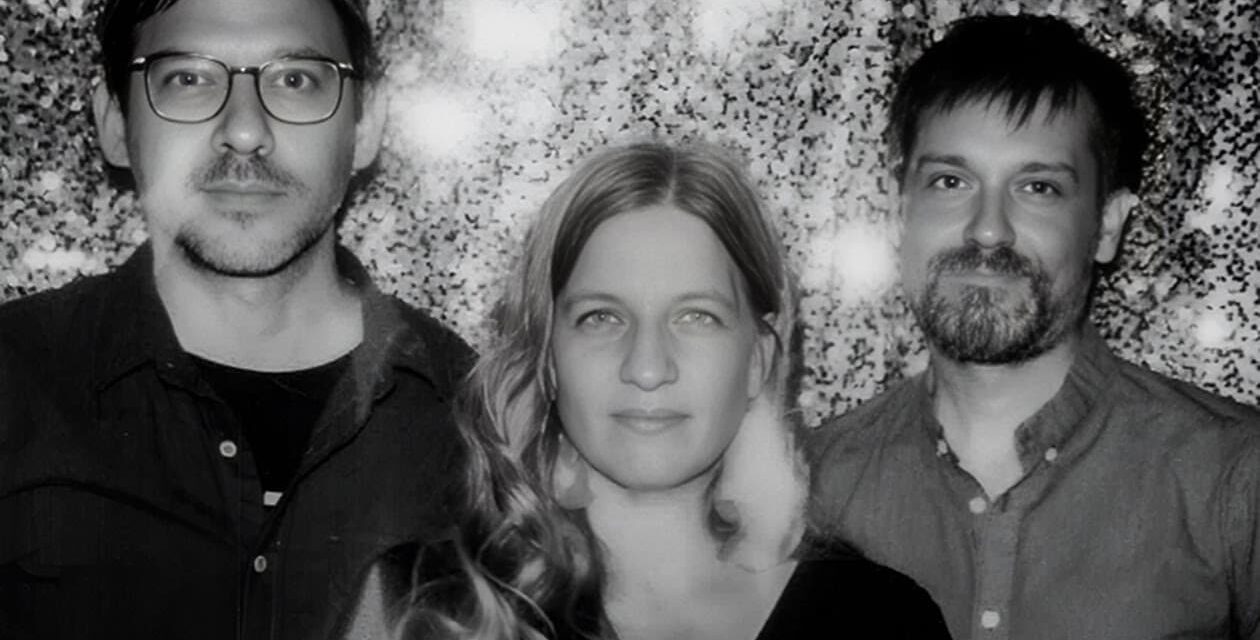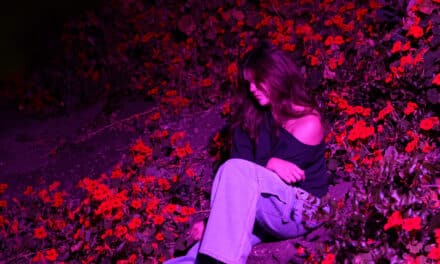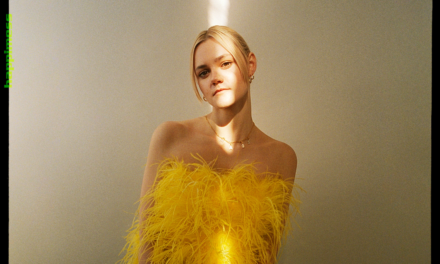There’s a certain magic that happens when a band stops trying to look cool and starts telling the truth. Richmond’s REVERSE YR CURSE has arrived at that moment with Where Are We Going and When Will We Get There?—a debut LP that feels less like a first statement and more like the product of years spent quietly sketching in the margins. Recorded with Alex De Jong at Spacebomb Studio, the album distills decades of listening, living, and longing into something both tender and unflinching.
Their lead single “Who Cares?” is the perfect first chapter: a bittersweet vignette about loneliness reframed as liberation. It’s a song about taking yourself out on a solo night—half date, half experiment in self-sufficiency—and finding out you don’t need the gaze of a crowd to make the evening matter. Paired with a Carter Amos–shot music video, it’s the sound of someone stepping out into the world, not to be seen, but to be.
Before the full record lands on September 19, REVERSE YR CURSE will give it a hometown christening on August 2 at Gallery 5. Expect the set to feel like an embrace, even if the lyrics sometimes land like a bruise.
“Who Cares?” opens with the kind of unhurried confidence you only get from a band that knows exactly what they want to say. The guitars shimmer without leaning on nostalgia, the rhythm section moves with an understated pulse, and the vocals—half-resigned, half-hopeful—carry the story like a friend who doesn’t sugarcoat the bad news but refuses to let you spiral alone.
Lyrically, it walks a fine line between self-effacement and self-empowerment: Yes, I’m lonely. No, I’m not staying home about it. There’s humor tucked inside the melancholy, the kind of inner monologue that turns an empty bar stool into an act of defiance. The production gives the song room to breathe; every detail feels intentional but never overworked, a hallmark of the band’s blend of experimentation and classic indie-rock craft.
It’s easy to hear the “artful, nuanced” DNA the band wears proudly—equal parts scrappy DIY spirit and careful melodic architecture. More importantly, “Who Cares?” hints at the emotional arc Where Are We Going and When Will We Get There? promises to deliver: a reckoning with past shadows, a fragile peace with the present, and the stubborn hope that maybe—just maybe—the best parts are still to come.
This isn’t music that tries to win you over with flash. It’s music that moves in slowly, sits next to you, and makes you feel less alone in the world.
The album title Where Are We Going and When Will We Get There? feels both existential and oddly casual—was that duality intentional?
At some point in the studio I was checking a microphone before doing a vocal take and just ended up singing that line. It was a silly improvisatory thing that stuck. There’s often something to be gleaned from automatic, or unconscious writing. I find that if I’m trying too hard to write something, it feels forced, or fake. The best stuff pours out as though it’s from the ether.
“Where are we going and when will we get there?” can refer to us as a society, us as individuals navigating existence, us as a band, etc. Yes, there is also a casual nature to it. Or it’s like putting your dog in the car. A dog seems to live always in the moment, in a way that humans cannot. A dog can be excited by whatever might happen, but it doesn’t know what it’s going to be.
“Who Cares” is framed around a solo night out—something kind of defiant and romantic at the same time. Was that written from experience, fantasy, or somewhere in between?
It comes from experience. I have lived a very long time with often debilitating depression, social anxiety, low self-esteem, shame, embarrassment; all sorts of uncomfortable stuff. I’ve lived in various cities, often alone. Sometimes there’s a battle between total reclusion and really trying to exist out in the world. I’ve spent countless nights out at shows by myself, or maybe at a bar or wherever. It’s easy to look around at all the groups of people and feel sorry for yourself for not being able to fit in. It’s easy to be an observer. But sometimes you can feel proud of yourself just for trying. This song was written from that place of courage, of saying screw it, I’m gonna go and see what happens. Sometimes you have to remind yourself that most people don’t really notice you, and that not all people are worth knowing. I put the lyrics in the third person so they would be about me. I made the character in the song a more memorable, desirable person. And I wanted Bonnie to sing it so it would alter the context even more.
There’s something deeply human in this idea of longing for connection while trying not to need it. How do you walk that line in your songwriting?
I don’t always have something specific in mind when it’s time to write lyrics. I like to just see what comes up. There were many years when I never used the pronoun “I” in a song. Instead I would use “we.” It served as both a protective measure, and a way to assume that I was speaking for anyone who feels the way I do. Eventually I allowed myself to use “I.” It was like I recognized that talking about yourself can be relatable, and can allow people to connect to you.
It seems natural for artists to want to reach people. That each artist has something different to express is important. That’s how lines are drawn between people. It’s how people find where they relate. It’s how friendships are formed. It’s how personal style is decided upon. It’s how people identify themselves in ways that others simply cannot understand. Knowing the insane difficulties throughout one’s own life, it’s hopeful to consider that someone with similar experiences might understand you. To feel understood is comforting. It’s a relief.
You’ve described this album as “casual pop intimacy steeped in nostalgia.” What does nostalgia sound like to you?
We had our friend Abi write a short bio for us so that there would be a genuine third person perspective. I decided to stretch it out by adding my own thoughts, and it ended up being a nice blend of perspectives. Abi is the one who wrote that sentence. She’s in the same age group as us and shares a lot of musical reference points, and so it happened that our songs provided her with a feeling of nostalgia. I have often thought that maybe I suffer from too much nostalgia. It’s not typically a pleasant feeling. There are many albums that I have loved in my past that I now find too difficult to listen to. Regardless of whether the album is attached to a happy time or a sad time, the outcome is that nostalgia tends to lean sad. Is that how it is for everybody?
Bonnie, Bret and I having spent our respective decades listening to such a wide variety of music, it makes sense that our songs would be built from references both similar and scattered. We say to ourselves that we’re not a “genre band” because we don’t want to make any one type of music. We want to make whatever we want. When we work on new ideas it’s easy to refer to them as sounding like this band or that. There are lots of spirit bands behind our songs. I’m sure lots of bands would say that same thing. To turn music memories into something new, something that is now our own, is really sweet.
Your sound has drawn comparisons to Broadcast, Blonde Redhead, Deerhoof —do you hear that in your own music, or do you feel like you’re living in a different sonic lane?
We have spent a lot of time listening to those three bands, so it was fairly easy for us to cite them for RIYL purposes. As a newer band that doesn’t have any reference point for new listeners, we have to put ourselves on the shelf alongside our many hero bands. We’re drawn to artists who make their own way, inevitably clearing new paths for others to walk. We want to express ourselves, and make something interesting. We just want each song to have its own life, and for the songs to go out there and have fun!
The harmonies across the record feel weightless, but the lyrics are often grounding and heavy. How conscious are you of balancing those emotional textures?
Bonnie is a really great singer, and musician, and we’re super lucky to have her in the band. She is inherently good at making vocal harmonies. Harmonies create mood and texture. It’s compelling to juxtapose rough, loud music with smooth, soft harmonies.
For whatever reason, up to this point, I have written all the lyrics except for the song “Shoes Today.” Bonnie wrote those. After so many years of being the singer, it’s been really cool to have the lyrics sung in someone else’s voice. It can change the perspective of the song, and it’s fun to play with that. She and I have discussions about that sort of thing.
What was it like working with Alex De Jong at Spacebomb? Did the Richmond setting influence the album’s shape or mood?
Working with Alex was an absolute pleasure. Over the last couple decades, I have been recording my own music, in whatever home I found myself in. The writing and recording were part of the same process. I wrote songs through the act of recording. Working within a band is a different process. We work on these songs slowly through time at our weekly practices, carving them into something we think is worth sharing. Deciding to make the investment into recording in a super nice studio was the right idea. None of us have ever spent so much money on recording an album before, but we believed in our songs enough to feel that it was worth making that investment. We bought the freedom to just play and sing, and have someone we quickly learned to trust pushing the buttons. Alex is a sensitive, intelligent and intuitive recording engineer. He was able to quickly grasp whatever it was we were looking for, even if we were only able to explain it in vague terms.
Bonnie and Bret have lived in Richmond a very long time. I lived in Richmond many years ago when I was in college, but moved off to several different cities, on both US coasts and in Europe as well. Life somehow brought me back to Richmond in 2022. That was when Bret and I started playing music together again. Soon thereafter I met Bonnie and convinced her to join us. Therefore, our band would not exist without Richmond.
There’s this sense in your music that you’re not chasing cool—but rather chasing truth, or relief, or something more internal. Was that a conscious shift from the EP to the album?
I would say that those types of things were definitely being sought after when we made our first EP as well. It might just be that we were a newer band, Bonnie had just joined us, I was still singing the majority of the songs at that time, and we just wanted to record those early songs in a quick and easy fashion. There’s a scrappiness to that first EP that seemed natural at the time. Our LP was recorded over a much longer period of time, and we took advantage of Spacebomb’s amenities. Spacebomb had two pianos, so it seemed obvious that we would try to throw piano into the album somehow. At various points in the album, all three of us are heard playing different piano parts,
mostly made on the fly. You can also hear Spacebomb’s marimba. We definitely did not preconceive that there would be marimba in any song. Bret just went for it! Lyrically speaking, I’d say we’re always after some sort of relatable truth.
You’ve talked about this being a “labor of love.” What did that process teach you about patience, collaboration, or even just how you show up as artists?
For us music persists as a labor of love because we don’t make any money from it. It’s just something we have to do. It helps us process our worlds. It’s how many of us best communicate our feelings. It allows for expression to be abstract, which is a strange freedom you don’t get in most conversations with people. Of course, much more of our time is spent doing things we don’t really want to do so we can pay the bills.
This band is meant to be collaborative, but there are some unavoidable troubles in that. I think any group of collaborators will tell you the same. We want to be free to make our own decisions within a song, and yet, somehow, we have to do what is best for the song itself. There’s bound to be struggles and hurt feelings. If one of us shows up to practice in a grumpy mood, it affects the others. That’s a responsibility we have to try to own up to, and that can be really difficult. Artists are known to be sensitive people, and we are each terribly sensitive. But we still have to show up to do the work because that is what we’ve chosen to do. It’s why we pay the ever-increasing rent at the practice space. It’s why we still put ourselves out there in front of people; anxiety-be damned.
What would you say to someone who listens to “Who Cares” and feels completely seen by it? What would you want them to know?
I would say thank you for listening. Thank you for understanding. At times it might not seem like it, but you are not really alone. Some people live through the same stuff. I’ve been through the wringer a thousand times and somehow I am still going.





